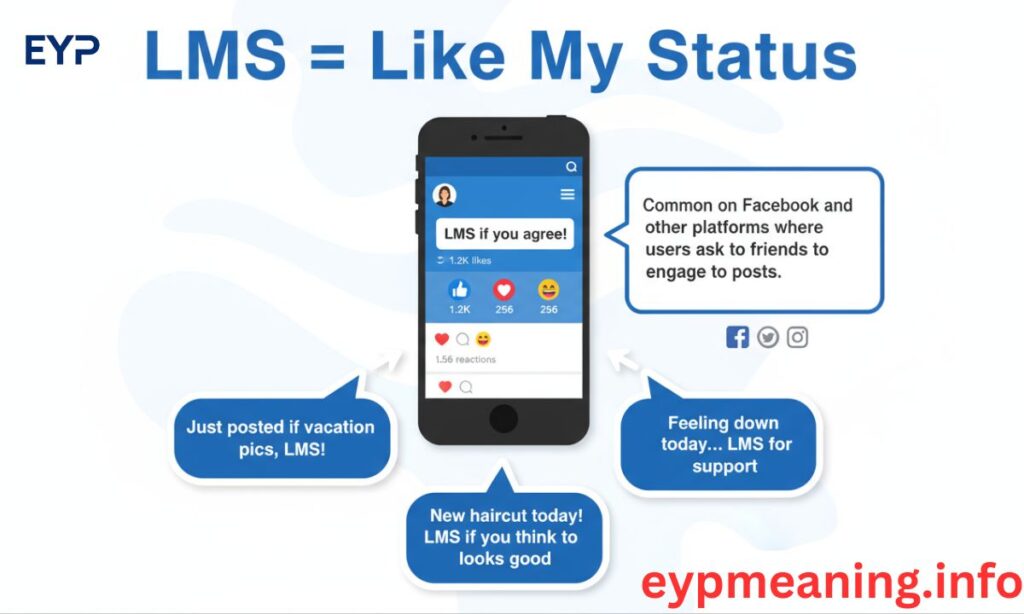LMS dominates modern texting and social media conversations across generations. In online culture, this versatile acronym connects users through engagement requests and visual sharing. Memes featuring LMS challenges went viral on Facebook and Instagram, creating interactive games that boosted post visibility.
Today’s digital communication landscape uses LMS on platforms like TikTok, Snapchat, and WhatsApp to drive likes, comments, and content sharing. Understanding LMS unlocks the language of internet culture, where three letters can mean “Like My Status,” “Let Me See,” or “Let Me Speak” depending on context and platform.
What Does LMS Mean in Text Slang?
LMS stands for “Like My Status” in most social media contexts. It’s a direct call to action. Users post LMS to encourage engagement. The phrase gained popularity on Facebook and Instagram. People use it to boost visibility of their posts.
LMS can also mean “Let Me See” in text conversations. This usage appears in casual chats. Someone might text LMS when they want to view something. The context determines which meaning applies. Both interpretations remain common in 2025.
A third meaning exists: “Let Me Speak“. This version appears less frequently. It’s used in group chats or debates. Someone types LMS to request speaking time. Understanding context is crucial for accurate interpretation.
| Acronym | Full Meaning | Common Platform | Usage Type |
| LMS | Like My Status | Facebook, Instagram | Engagement Request |
| LMS | Let Me See | Text Messages, WhatsApp | Casual Conversation |
| LMS | Let Me Speak | Group Chats, Discord | Discussion Control |
Origin and Evolution of LMS
LMS originated in the early 2010s. Facebook status updates drove its creation. Users wanted more likes and comments. The phrase “Like My Status” became shortened to LMS. This trend spread rapidly across social platforms.
The evolution mirrors other text slang patterns. Abbreviations save time and characters. LMS fit perfectly into the 140-character Twitter limit era. Young users adopted it first. Within months, it became mainstream internet language.
By 2015, LMS had multiple meanings. The “Let Me See” interpretation emerged from texting culture. Snapchat and Instagram Stories popularized visual sharing. People started using LMS to request photos or videos. The acronym adapted to new communication needs.
Why People Use LMS Online
Engagement is the primary reason. Social media algorithms favor interaction. Posts with more likes reach wider audiences. LMS directly asks followers to engage. It’s a simple but effective strategy.
Time-saving motivates LMS usage. Typing three letters beats full phrases. In fast-paced conversations, brevity matters. LMS conveys meaning instantly. Users appreciate the efficiency.
Trend participation drives adoption. When friends use LMS, others follow. Social media culture thrives on shared language. Using LMS signals you’re current. It creates a sense of community among users.
- Boosts post visibility through algorithm triggers
- Saves typing time in quick conversations
- Creates engagement games among friend groups
- Encourages interaction without seeming desperate
- Builds social currency through participation
Is LMS Offensive or Playful?
LMS is generally playful and harmless. Most users see it as lighthearted. It’s an engagement tactic, not aggressive language. The tone depends on context and relationship.
Some find LMS posts annoying. They view it as attention-seeking behavior. Excessive use can irritate followers. Posting LMS daily might reduce genuine engagement. Moderation is key to maintaining positive reception.
The “Let Me See” version is neutral. It’s a simple request in conversation. No offensive connotation exists. However, demanding tone matters. “LMS now!” sounds pushy. “LMS when you can” feels friendly.
Professional settings avoid LMS entirely. Corporate social media uses formal language. Business communications require clarity. LMS belongs to casual, personal interactions. Know your audience before using it.
LMS in Popular Culture, Memes, and Viral Trends
Meme culture embraced LMS quickly. Early Facebook memes featured LMS challenges. Users posted “LMS and I’ll tell you what I think of you.” These games went viral repeatedly.
Instagram influencers transformed LMS usage. They created engagement pods—groups exchanging likes. Members comment “LMS” to signal participation. This tactic artificially boosts post performance. Algorithms eventually caught on.
TikTok introduced new LMS variations. Creators use it in comment sections. “LMS if you agree” appears under controversial videos. It measures audience sentiment quickly. The format adapts to short-form content perfectly.
Twitter users mock excessive LMS posting. Satirical tweets highlight attention-seeking behavior. “LMS or my dog dies” jokes became a meme format. This self-aware humor shows evolving attitudes toward the acronym.
Platform-Specific LMS Usage
Facebook remains LMS headquarters. Status updates feature it prominently. Users post “LMS for a tbh” (to be honest). These engagement games dominated 2012-2016. Though less common now, they still appear.
Instagram uses LMS in captions and comments. Influencers request “LMS if you want more content like this.” It measures audience preferences. Stories polls replaced some LMS usage. The acronym persists in direct messages.
Snapchat
Snapchat interprets LMS as “Let Me See.” Users request snaps or stories. “LMS your outfit” is common phrasing. The visual platform emphasizes showing over liking. This shifted LMS meaning organically.
Twitter uses LMS sparingly. The platform favors retweets and replies. “Like my status” doesn’t translate well. However, “LMS for DM” appears occasionally. Users gate-keep content behind likes.
TikTok
TikTok revitalized LMS through comments. Creators pin “LMS if you’re team [option]” comments. It creates interactive experiences. The algorithm boosts videos with high engagement. LMS serves this purpose effectively.
Examples of LMS in Text, Memes, and Social Media
Text Examples
Example 1:
- Person A: “I got tickets to the concert!”
- Person B: “LMS! Which seats?”
- (Meaning: Let Me See)
Example 2:
- Person A: “Just posted new pics”
- Person B: “LMS bro, need those likes”
- (Meaning: Like My Status)
Example 3:
- Person A: “Anyone have opinions on this?”
- Person B: “LMS, I have thoughts”
- (Meaning: Let Me Speak)
Example 4:
- Instagram Caption: “New haircut! LMS if you like it 💇”
- (Direct engagement request)
Example 5:
- Text Message: “Check out this meme LMS“
- Response: “sends screenshot“
- (Requesting to see content)
Meme Examples
Classic Facebook Meme: “LMS and I’ll assign you a Hogwarts house”
- Engagement bait format
- Viral in 2013-2015
- Created mass interaction
Satirical Twitter Meme: “LMS or I’ll assume you hate me and my entire family”
- Mocks desperate posting
- Self-aware humor
- Comments roast the concept
Instagram Story Template: “LMS for a rating”
- Screenshot and reply format
- Drives DM engagement
- Popular with teens
TikTok Comment Format: “LMS if you’re watching in 2025″
- Measures current viewership
- Creates community feeling
- Boosts algorithm performance
Image Prompts for SEO Optimized Article
Prompt 1: “Modern smartphone screen showing text conversation with LMS acronym highlighted, bright colors, clean design, social media icons in background”
Prompt 2: “Split image comparing Facebook Like button and text message bubble, LMS written in bold letters, arrows showing evolution”
Prompt 3: “Young person typing on phone with thought bubble showing multiple LMS meanings, colorful illustration style”
Prompt 4: “Collage of social media platforms (Instagram, TikTok, Snapchat, Facebook) with LMS examples on each, vibrant layout”
Related Acronyms and Slang
Understanding LMS helps decode similar terms. Text slang follows patterns. Many acronyms request engagement or information.
| Acronym | Meaning | Similar To |
| TBH | To Be Honest | LMS engagement game |
| SMH | Shaking My Head | Reaction expression |
| IMO | In My Opinion | Discussion acronym |
| FYP | For You Page | TikTok engagement |
| DM | Direct Message | Platform-specific action |
| RT | Retweet | Twitter engagement |
LMK (Let Me Know) shares functionality with LMS. Both request action or information. “LMK your thoughts” parallels “LMS to vote.” They create interactive dynamics.
OOTD (Outfit Of The Day) often pairs with LMS. Fashion posts request likes explicitly. “OOTD LMS if you approve” combines both trends. This layering is common practice.
Tips to Decode LMS and Other Text Slang
Context is everything. The surrounding conversation reveals meaning. LMS in Facebook comments means “Like My Status.” LMS in personal texts suggests “Let Me See.” Platform matters significantly.
Check the platform. Each social network has unique slang culture. Instagram favors engagement requests. Snapchat emphasizes visual sharing. Platform norms guide interpretation.
Consider the relationship. Close friends use LMS casually. Strangers might use it formally. Relationship dynamics affect tone and meaning. Personal history provides context clues.
Look for additional context. Words surrounding LMS clarify intent. “LMS your dog” clearly means show me. “New post, LMS” obviously requests likes. Supporting text is crucial.
When uncertain, ask. Misunderstanding is normal. A quick “What does LMS mean here?” prevents confusion. Most people explain happily. Communication beats assumption.
- Read the full message before interpreting
- Note which app you’re using
- Consider urgency of the request
- Check for emojis that add context
- Observe how others respond to similar messages
Viral Hashtags and Trends Related to LMS
#LMS has millions of posts across platforms. Instagram leads with engagement-focused content. Users tag #LMS hoping for algorithm boosts. The hashtag became engagement currency.
#LikeMyStatus is the spelled-out version. It’s more common on Facebook. Older demographics prefer full phrases. This hashtag peaked around 2014-2015. Usage declined but never disappeared.
#LMSChallenge emerged on TikTok. Creators asked followers to like for specific actions. “LMS and I’ll duet your video” drove participation. These challenges generate massive engagement numbers.
#LetMeSee trended on Snapchat and Instagram Stories. Visual content platforms embraced this interpretation. Users tag stories requesting friend responses. It maintains steady popularity.
#TBH4TBH combined LMS culture with honesty posts. Users exchange compliments for likes. The format dominated teen social media. Though less viral now, it established engagement patterns.
FAQ,s
What does LMS stand for in texting?
LMS typically means “Like My Status” or “Let Me See” depending on context and platform.
Is LMS still popular in 2025?
Yes, LMS remains widely used on Instagram, Snapchat, and TikTok with evolving applications.
Can LMS be used professionally?
No, LMS is casual slang inappropriate for professional or business communications.
How do I respond to LMS?
Like the post if it means Like My Status, or show requested content if it means Let Me See.
Is asking for LMS considered annoying?
Occasional use is fine, but excessive LMS posts may irritate followers and reduce genuine engagement.
Does LMS work the same on all platforms?
No, LMS meaning varies by platform—Facebook emphasizes likes while Snapchat emphasizes sharing visuals.
Are there alternatives to LMS?
Yes, alternatives include “like if you agree”, “show me”, or direct engagement questions.
Can LMS hurt my social media engagement?
Overusing LMS can appear desperate, potentially decreasing organic reach and follower interest over time.
What’s the difference between LMS and LMK?
LMS requests likes or visuals; LMK (Let Me Know) requests information or updates.
Is LMS appropriate for all ages?
LMS is youth-oriented slang but harmless; older users may prefer spelled-out phrases.
Conclusion
LMS represents modern digital communication evolution. This simple acronym carries multiple meanings. Understanding context separates confusion from clarity. Social media platforms shape how we interpret LMS.The acronym’s flexibility ensures continued relevance. As online culture shifts, LMS adapts accordingly. From Facebook status games to TikTok engagement tactics, it persists.
Learning text slang like LMS improves digital literacy.Use LMS strategically for best results. Authentic engagement beats forced interaction. Balance trendy language with genuine communication. The digital world rewards those who understand its evolving language. Master LMS and similar slang to navigate online culture effectively in 2025 and beyond.






